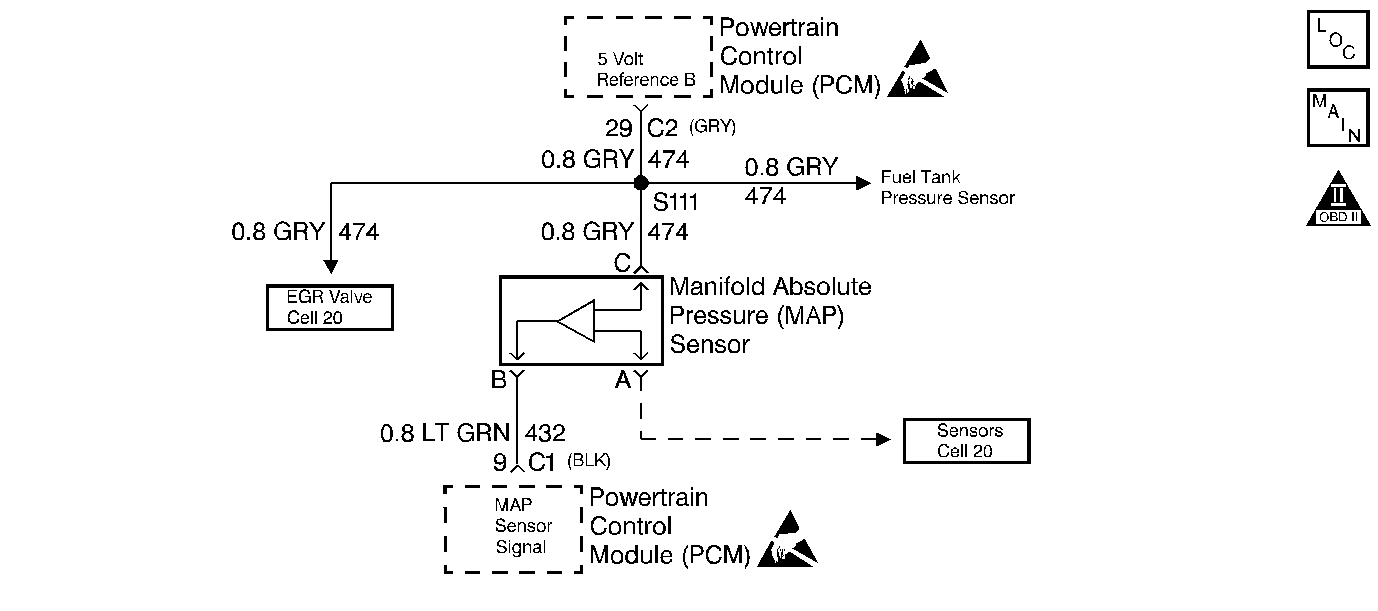
Circuit Description
The PCM uses the Manifold Absolute Pressure (MAP) sensor output voltage in order to assist in controlling the fuel delivery and the ignition timing. The PCM supplies a 5 volt reference signal voltage and a ground circuit to the MAP sensor. As the manifold pressure changes, the output voltage of the sensor also changes. By monitoring the sensor output voltage, the PCM knows the manifold pressure. A lower pressure (low voltage) output voltage will read between 1.0 to 1.5 volts at idle. While higher pressure (high voltage) output voltage will read between 4.5 to 4.8 at Wide Open Throttle (WOT). The PCM uses the MAP sensor to record the barometric pressure during an engine start up and at wide open throttle. This allows the PCM to make adjustments for different altitudes.
Conditions for Setting the DTC
| • | The engine speed is stable ± 150 RPM. |
| • | The Idle Air Control (IAC) valve is stable ± 10 counts. |
| • | The Throttle Position (TP) sensor is stable ± 1 %. |
| • | The EGR valve is stable ± 0 %. |
| • | The above conditions met for 0.4 seconds. |
| • | The Manifold Absolute Pressure (MAP) sensor changes greater than 6.3 kPa in 15.6 mS. |
| • | One or more of the following DTCs are not set P0107 or P0108. |
Action Taken When the DTC Sets
| • | The malfunction indicator lamp (MIL) will illuminate. |
| • | The PCM will record the operating conditions at the time that the diagnostic fails. The Freeze Frame and Failure Records buffers will store this information. |
| • | A history DTC stores. |
Conditions for Clearing the MIL/DTC
| • | The malfunction indicator lamp (MIL) will turn OFF after 3 consecutive ignition cycles in which the diagnostic runs without a fault. |
| • | A history DTC will clear after 40 consecutive warm up cycles without a fault. |
| • | Use a scan tool to clear the DTCs. |
Diagnostic Aids
With the ignition ON and the engine off, the manifold pressure should be equal to the atmospheric pressure. The signal voltage will be high. A comparison of this reading with a known good vehicle with the same style sensor is a good way to check the accuracy of a suspect sensor. Readings should be within ± 0.4 volt.
Test Description
The numbers below refer to the step numbers on the diagnostic table.
-
The Powertrain OBD System Check prompts the technician to complete some basic checks and store the Freeze Frame Data and the Failure records on the scan tool if applicable. This creates an electronic copy of the data taken when the fault occurred. This information on the scan tool can be referred to later.
-
Output changes greater than 6.3 kPa verify if the fault is present
-
Whenever the PCM recognizes the change, the PCM, the MAP sensor 5V reference circuit, and the MAP signal circuit are OK. Whenever the MAP sensor ground circuit is faulty, the A/C system may be inoperative and a DTC P0530 may also be set.
-
Output changes greater than 6.3 kPa indicate a possible faulty connector or connection.
-
Check terminals for proper mating, broken locks, improperly formed or damaged terminals, and poor terminal to wiring connections.
-
Because the MAP sensor is sensitive to pressure change, the MAP sensor must have its own vacuum source or the MAP sensor may detect pressure changes due to other devices using the same vacuum source.
-
Before replacing the PCM, check terminals for improper mating, broken locks, or physical damage to the wiring harness. Reprogram the replacement PCMs. Refer to the latest Techline Information for programming procedures.
Step | Action | Value(s) | Yes | No |
|---|---|---|---|---|
Was the Powertrain On-Board Diagnostic (OBD) System Check performed? | -- | |||
Does the scan tool display a MAP kPa varying more than the specified value? | 6.3 kPa (0.33 V) | |||
Does the scan tool display a steady MAP voltage of the specified value or less? | 1.0 V | |||
With the engine still idling, twist the MAP sensor electrical connector by hand (only). Does the scan tool display a MAP kPa varying more than the specified value? | 6.3 kPa (0.33 V) | |||
Inspect the MAP and PCM electrical connector terminals for poor connections. Was a problem found? | -- | |||
6 | Inspect the PCM electrical connector terminals for poor connections. Was a problem found? | -- | ||
7 |
Does the scan tool display a MAP kPa varying more than the specified value? | 6.3 kPa (0.33 V) | Go to the Diagnostic Aids | |
8 | Repair the connector terminals as necessary. Refer to Wiring Repairs in Engine Electrical. Is the action complete? | -- | -- | |
Is the vacuum source OK? | -- | |||
10 | Replace the MAP sensor. Refer to Manifold Absolute Pressure Sensor Replacement . Is the action complete? | -- | -- | |
11 | Repair the vacuum source. Is the action complete? | -- | -- | |
Replace the PCM. Refer to Powertrain Control Module Replacement/Programming . Is the action complete? | -- | -- | ||
13 |
Does the scan tool indicate that this diagnostic ran and passed? | 90°-95° C | ||
14 | Check if any additional DTCs are set. Are any DTCs displayed that have not been diagnosed? | -- | Go to the Applicable DTC Table | System OK |
